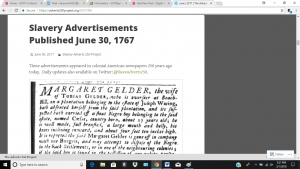The Adverts 250 project is a digital history exhibit that republishes advertisements from 250 years prior on an online forum. This project was created by Carl Robert Keyes and is supported by his “curators”, students taking Colonial America, Revolutionary America and other Public History courses at Assumption College. The purpose of this project is to allow people today to view advertisements from Colonial America, which include advertisements of different merchandise as well as slave sale and information. While searching through the website you are able to come across different primary sources. These primary sources include clippings from newspapers at that time that express the different aspects of life 250 years ago. Some of these primary sources include slave owners reporting run away slaves, the sale of slaves and even different tradesmen marketing themselves and their product.
Overall, the digital history exhibit is easy to navigate. It allows you to look into different months and years as well as having explanations that make it easier to understand what is shown in the photos. The exhibit could’ve been better by narrowing down how to search for different dates, as well as trying to make the adverts more legible by having a verbatim copy somewhere in order to better understand the photo. The digital history exhibit is also not very visually appealing. When presenting history in a digital exhibit there are definitely positives and negatives. Some positives include the gain of knowledge about what was common 250 years ago and being able to have a small insight into what happened then. It shows different trades and things that were of importance at this time period. Viewing information this way gives a more indepth viewpoint than it may when reading about these occurrences in a history textbook. Negative aspects of the digital history exhibit include the predescribed explanation of these documents, which can include certain bias. It is also much more powerful of an experience if an individual can see these advertisements in person rather than through a screen.

Kara Smith
